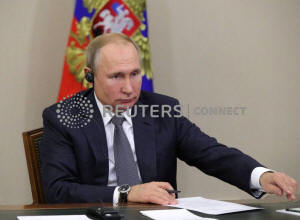Putin and Xi oversee launch of landmark Russian gas pipeline to China
 Send a link to a friend
Send a link to a friend
 [December 02, 2019]
By Vladimir Soldatkin [December 02, 2019]
By Vladimir Soldatkin
SOCHI, Russia (Reuters) - Russian President
Vladimir Putin and his Chinese counterpart Xi Jinping on Monday oversaw
the launch of a landmark pipeline that will transport natural gas from
Siberia to northeast China, an economic and political boost to ties
between Moscow and Beijing.
The start of gas flows via the Power of Siberia pipeline reflects
Moscow's attempts to pivot to the East to try to mitigate pain from
Western financial sanctions imposed over its 2014 annexation of
Ukraine's Crimea.
The move cements China's spot as Russia's top export market and gives
Russia a potentially enormous new market outside Europe. It also comes
as Moscow is hoping to launch two other major energy projects -- the
Nord Steam 2 undersea Baltic gas pipeline to Germany and the TurkStream
pipeline to Turkey and southern Europe.
The 3,000-km-long (1,865 mile) Power of Siberia pipeline will transport
gas from the Chayandinskoye and Kovytka fields in eastern Siberia, a
project expected to last for three decades and to generate $400 billion
for Russian state coffers.

"This is a genuinely historical event not only for the global energy
market but above all for us, for Russia and China," said Putin, who
watched the launch via video link from the Russian Black Sea resort of
Sochi.
"This step takes Russo-Chinese strategic cooperation in energy to a
qualitative new level and brings us closer to (fulfilling) the task, set
together with Chinese leader Xi Jinping, of taking bilateral trade to
$200 billion by 2024."
The new pipeline emerges in Heilongjiang, which borders Russia, and goes
onto Jilin and Liaoning, China's top grain hub.
Xi told Putin via a video link on Monday that the newly launched gas
pipeline is "a landmark project of bilateral energy cooperation" and an
"example of deep integration and mutually beneficial cooperation".
Flows via the pipeline are expected to gradually rise to 38 billion
cubic metres (bcm) per year in 2025, possibly making China Russia's
second-largest gas customer after Germany, which bought 58.50 bcm of gas
from Russia last year.
Moscow began supplying natural gas to western and central Europe in the
1950s and Europe has long been Russia's major consumer of gas, supplied
by Kremlin-controlled energy giant Gazprom <GAZP.MM>, with total annual
supplies of around 200 bcm.
The price China is paying for Russian gas in the new pipeline remains a
closely kept secret with various industry sources saying it is tied to
the price of an oil products basket.
[to top of second column]
|

Russia's President Vladimir Putin takes part in a ceremony launching
Gazprom's Power of Siberia gas pipeline to China via a video link in
Sochi, Russia December 2, 2019. Sputnik/Mikhail Klimentyev/Kremlin
via REUTERS

Neither Putin, nor Xi commented on Monday on the gas price Beijing
is set to pay under the contract.
INCREASED COMPETITION
Russian pipeline gas will compete against other pipeline gas
supplies to China, including from Turkmenistan, as well as against
shipments of sea-borne liquefied natural gas (LNG).
"China's gas demand growth is expected to slow down from previous
years yet remains strong, with an estimated 10% year-on-year growth
for the first nine months of 2019," Jean-Baptiste Dubreuil, from the
International Energy Agency's natural gas market analysis team, told
Reuters.
"Our medium term forecast 'Gas 2019' assumes average 8% growth until
2024 (compared with a world average of 1.6% pa)."
Russia has been in talks with China about raising gas sales via
other routes too, such as from the Russian Far East and via Mongolia
or Kazakhstan, but has not yet clinched any deals.
Russia has dramatically increased deliveries of oil to China in the
past decade, challenging Saudi Arabia as China's top oil supplier in
certain months.
To achieve that, Russia launched a major oil pipeline to China,
which today ships 600,000 barrels per day (bpd), and opened a new
port at Kozmino on the Pacific. Russia also ships 200,000 bpd to
China via a pipeline crossing Kazakhstan.
Russian coal sales to the east in 2018 exceeded 100 million tonnes,
accounting for more than half of Russia's total coal exports.
(Additional reporting by Katya Golubkova and Maria Kiselyova in
Moscow; Writing by Vladimir Soldatkin/Andrew Osborn; editing by
Andrew Osborn/Katya Golubkova/Christina Fincher)
[© 2019 Thomson Reuters. All rights
reserved.]
Copyright 2019 Reuters. All rights reserved. This material may not be published,
broadcast, rewritten or redistributed.
Thompson Reuters is solely responsible for this content.
 |